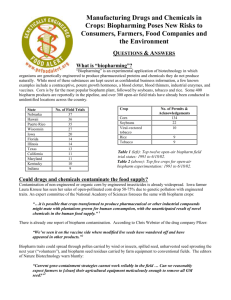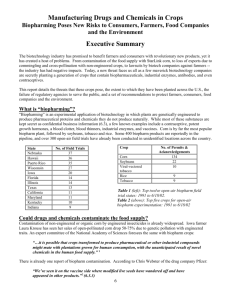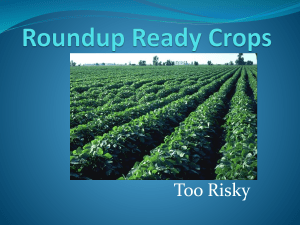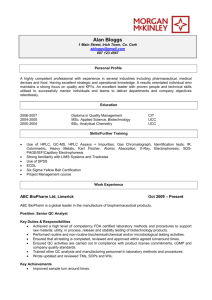Biopharm Bill Questions & Answers
advertisement
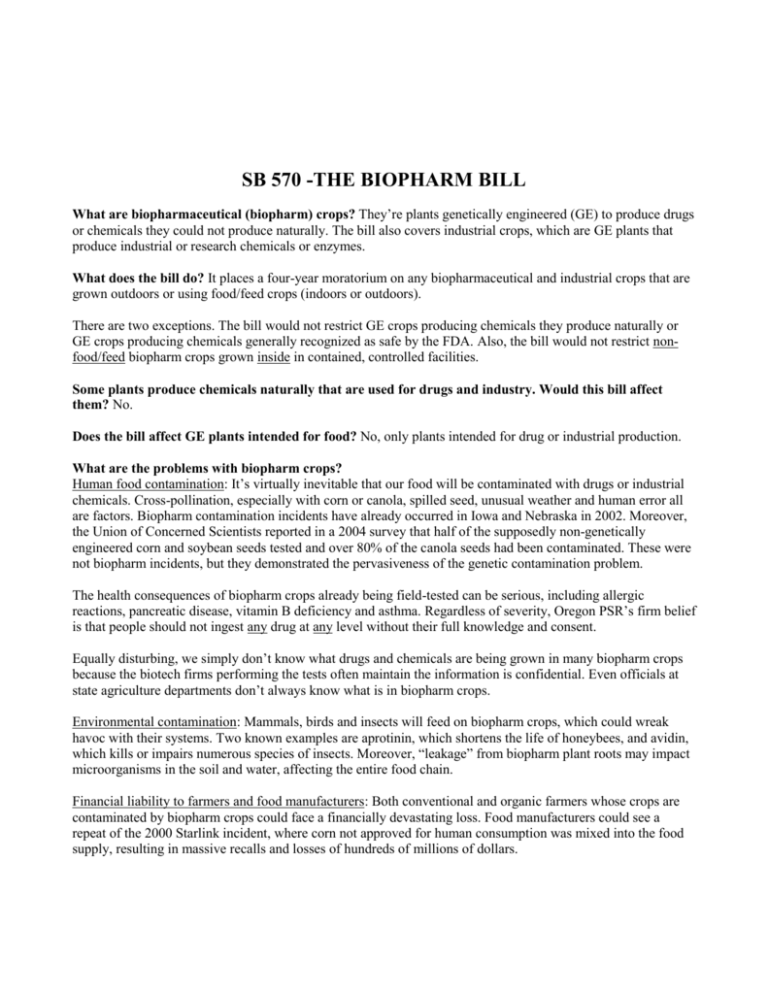
SB 570 -THE BIOPHARM BILL What are biopharmaceutical (biopharm) crops? They’re plants genetically engineered (GE) to produce drugs or chemicals they could not produce naturally. The bill also covers industrial crops, which are GE plants that produce industrial or research chemicals or enzymes. What does the bill do? It places a four-year moratorium on any biopharmaceutical and industrial crops that are grown outdoors or using food/feed crops (indoors or outdoors). There are two exceptions. The bill would not restrict GE crops producing chemicals they produce naturally or GE crops producing chemicals generally recognized as safe by the FDA. Also, the bill would not restrict nonfood/feed biopharm crops grown inside in contained, controlled facilities. Some plants produce chemicals naturally that are used for drugs and industry. Would this bill affect them? No. Does the bill affect GE plants intended for food? No, only plants intended for drug or industrial production. What are the problems with biopharm crops? Human food contamination: It’s virtually inevitable that our food will be contaminated with drugs or industrial chemicals. Cross-pollination, especially with corn or canola, spilled seed, unusual weather and human error all are factors. Biopharm contamination incidents have already occurred in Iowa and Nebraska in 2002. Moreover, the Union of Concerned Scientists reported in a 2004 survey that half of the supposedly non-genetically engineered corn and soybean seeds tested and over 80% of the canola seeds had been contaminated. These were not biopharm incidents, but they demonstrated the pervasiveness of the genetic contamination problem. The health consequences of biopharm crops already being field-tested can be serious, including allergic reactions, pancreatic disease, vitamin B deficiency and asthma. Regardless of severity, Oregon PSR’s firm belief is that people should not ingest any drug at any level without their full knowledge and consent. Equally disturbing, we simply don’t know what drugs and chemicals are being grown in many biopharm crops because the biotech firms performing the tests often maintain the information is confidential. Even officials at state agriculture departments don’t always know what is in biopharm crops. Environmental contamination: Mammals, birds and insects will feed on biopharm crops, which could wreak havoc with their systems. Two known examples are aprotinin, which shortens the life of honeybees, and avidin, which kills or impairs numerous species of insects. Moreover, “leakage” from biopharm plant roots may impact microorganisms in the soil and water, affecting the entire food chain. Financial liability to farmers and food manufacturers: Both conventional and organic farmers whose crops are contaminated by biopharm crops could face a financially devastating loss. Food manufacturers could see a repeat of the 2000 Starlink incident, where corn not approved for human consumption was mixed into the food supply, resulting in massive recalls and losses of hundreds of millions of dollars. Q. Since no biopharm crops have been grown in Oregon for almost 10 years, is this a problem? In the past four years, every state bordering Oregon – California, Washington, Idaho and Nevada – has had outdoor biopharm crop testing approved. Oregon is perfectly suited in both climate and soil to have biopharm tests and it could happen at any time. Q. Does Oregon have the authority to enact legislation on the planting of biopharm crops more restrictive than federal regulations? Oregon PSR has consulted with a number of lawyers and all have offered the opinion that the federal government has not “occupied the field” regarding GE crops. This allows more stringent regulation by states. Significant activity outside Oregon indicates that states or localities may pass laws restricting GE crops. Massachusetts, Texas and Colorado all proposed legislation in 2003 restricting biopharm crops and California took action against GE biopharm rice. Also, the Congressional Research Service reviewed Vermont’s state-wide moratorium bill on all GE crops in August 2004 and expressed its opinion that the bill would stand up to any Constitutional challenge. The opinion is specific to Vermont, but the issues regarding state authority are similar. Q. Couldn’t biopharming be a growth industry for Oregon, creating many jobs? No one can say for sure, but it’s highly doubtful. It’s essential to be clear on definitions and differentiate between various types of biotechnology. There have been over 100 pharmaceuticals developed involving genetic processes employing animal, bacterial and yeast cell cultures. They are produced in contained, controlled manufacturing plants. This technology, not biopharming, has been a successful industry. In contrast, not a single biopharm drug has been approved by the FDA since testing began in 1991, and only a few industrial chemicals have been developed. This is mainly because of the difficulties in extracting, purifying and achieving consistency in biopharm crops. This doesn’t mean that none will ever be approved, but several independent experts question whether large numbers of people will ever be employed, either on the farm or in processing facilities. Even counting ALL pharmaceutical manufacturing, research and development, there are only an estimated 1,500 jobs in Oregon (Source: Ross DeVol et al, Milken Institute - 2003). This should be compared to the estimated 128,000 jobs (Source: Portland State U. Food Industry Leadership Center – 2002) already existing in Oregon farming, food manufacturing and wholesale firms, many of which could be affected if food crops were contaminated. The risks far outweigh highly speculative benefits. Q. Since the USDA decides procedures and rules for biopharm testing, shouldn’t this be handled at the federal level? Oregon PSR, along with many other concerned agencies, has contacted the USDA on several occasions urging restrictions on biopharming. We will continue to do so. However, the USDA still allows openair field testing and use of food crops and is unlikely to change these policies in the near future. Indeed, the agency has even helped fund biopharm tests. If Oregon wants protection, we must take action here and now. Q. Who else believes USDA regulations are inadequate? The National Academy of Sciences, Center For Food Safety, Consumer Policy Institute, Friends of the Earth, Grocery Manufacturers of America, Sierra Club, National Family Farm Coalition, Union of Concerned Scientists and many others. Even Nature Biotechnology, the leading pro-GE journal, has written editorials critical of the way biopharming has been handled. Q. What are the main points Oregon PSR is trying to make? Biopharm crops are not food. They are crops used for drug or industrial manufacturing, and must be treated as such. If grown, they must be in contained, controlled facilities, just like any other drug or industrial production. Obviously, Oregon PSR favors development of new, beneficial, lower-cost drugs. We simply believe this can, and should, be done without undue risk of contaminating our food supply and environment and threatening the livelihoods of food producers. Contact: Rick North, Project Director, Oregon PSR Campaign For Safe Food 503-968-1520 hrnorth@hevanet.com



